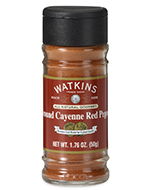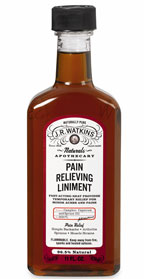Cayenne Pepper Red Hot and Healthy!
Cayenne or Red Pepper comes from chile peppers, or capsicums. Prepared from one of the hottest chile pods, it’s always sold as a ground spice. Not only does it heat up your meals, it also has a wide range of potential health benefits. Used both externally and internally, cayenne pepper is inexpensive and can be purchased at most grocery stores and gourmet shops. Here are some of the purported benefits of this colorful spice.
Lessen cold, flu, and sore throat symptoms. Cayenne is antibacterial and when eaten or applied externally it causes sweating, which similar to a fever, can help fight infections, especially in the throat and upper-respiratory tract. Try adding 1/4 teaspoon to salt water and gargle. When it’s combined with garlic in a broth or in home made chicken soup, it is a great early treatment to reduce or lesson colds and flu symptoms.
For ulcer prevention. The use of cayenne to prevent ulcers may seem counter-intuitive. However, contrary to popular belief, hot peppers do not cause ulcers. Red pepper may, in fact, protect the stomach lining from developing an ulcer. It has been shown to protect laboratory animals’ stomachs from large doses of aspirin that would normally cause ulcers.
For weight management. An interesting study in England showed as much as a 25 percent increase in metabolic rates – that is, how fast you burn calories – in individuals who ate a teaspoon each of red pepper sauce and mustard at every meal. In addition, if you eat hot and spicy food you will be likely to drink more water, causing a feeling of fullness that will also help prevent overeating. Americans, though, tend to add spicy hot pepper sauces to high-fat foods, so be sure you don’t undermine your weight loss attempts by using cayenne in high-fat, high-calorie foods.
Ease arthritis pain. How ironic that a spice that when eaten, causes pain that feels like fire in your mouth can actually help pain in the body. However capsaicin, a chemical in cayenne that accounts for its “hotness,” relieves pain by stimulating the body’s own pain-relieving mechanism – namely, endorphins. Cayenne pepper also contains pain-relieving compounds called salicylates. (Aspirin contains a form of salicylate called acetylsalicylic acid.)
You can take cayenne internally in capsules or by adding it to your foods and drinks. Applying cayenne on the skin at the site of pain is also effective, research has clearly shown that capsaicin liniments and creams relieve pain when applied to arthritic joints and sore muscles. It apparently dulls local pain receptors, and it also increases blood flow to the area.
Circulatory benefits. Cayenne increases circulation and makes the blood less likely to clot, according to James A. Duke, PhD author of The Green Pharmacy: The Ultimate Compendium Of Natural Remedies From The World’s Foremost Authority On Healing Herbs. Prevention of clot formation helps avoid scenarios that could give rise to heart attacks and strokes. The aspirin-like compounds “thin” the blood as aspirin itself is reported to do.
Reduce hypertension. As mentioned above, cayenne helps circulation and this can also effect blood pressure. The salicylates act like aspirin, thinning the blood but without the stomach irritation that can occur with aspirin.
When cooking use Cayenne Red Pepper in Italian and Mexican dishes, curries, deviled eggs, seafood, cottage and cream cheeses, cooked green vegetables, Welsh rarebit, cheese soufflés, plus many meats and sauces. In Cajun cooking, it is frequently blended with black and white pepper to make an “all-purpose pepper.”
This humble spice is not just a lively condiment, it may have health benefits as well. You’ll find cayenne red pepper, liniments and more in the JR Watkins online store. (Sorry cayenne pepper currently isn’t available in Canada.)
Important Note: Information presented on this site is for informational or entertainment purposes only. These statements have not been evaluated by the Food and Drug Administration and are not intended to diagnose, treat, cure or prevent any disease. Always consult your healthcare or medical professional for advise.








No Comments Yet.